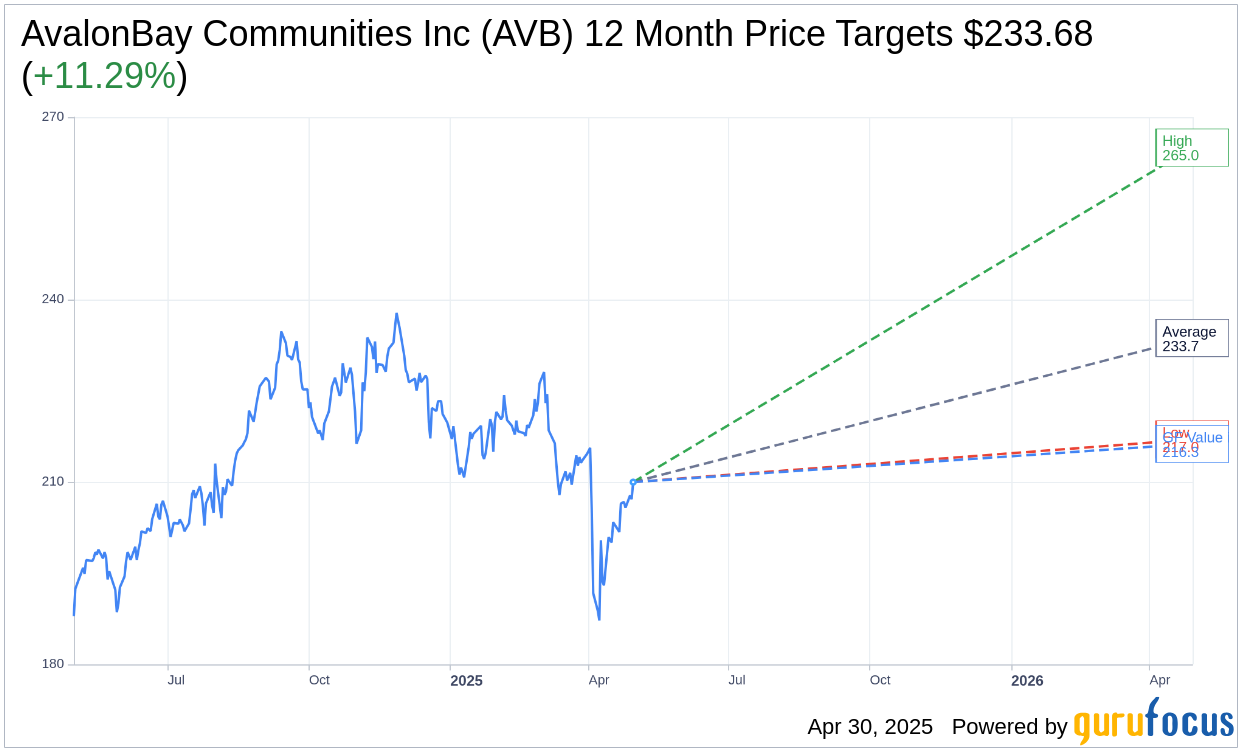For the recent period, AvalonBay Communities (AVB, Financial) experienced a notable increase in its Same Store Residential segment revenues, which grew by $20.29 million, amounting to a 3.0% rise, pushing total revenues to $693.07 million. Concurrently, operating expenses in the Same Store Residential category saw an increase of $8.27 million, marking a 4.0% growth, bringing the total to $214.76 million. As a result, the net operating income (NOI) for this segment also climbed by $12.03 million, or 2.6%, reaching a total of $478.32 million.
Wall Street Analysts Forecast

Based on the one-year price targets offered by 19 analysts, the average target price for AvalonBay Communities Inc (AVB, Financial) is $233.68 with a high estimate of $265.00 and a low estimate of $217.00. The average target implies an upside of 11.29% from the current price of $209.98. More detailed estimate data can be found on the AvalonBay Communities Inc (AVB) Forecast page.
Based on the consensus recommendation from 24 brokerage firms, AvalonBay Communities Inc's (AVB, Financial) average brokerage recommendation is currently 2.5, indicating "Outperform" status. The rating scale ranges from 1 to 5, where 1 signifies Strong Buy, and 5 denotes Sell.
Based on GuruFocus estimates, the estimated GF Value for AvalonBay Communities Inc (AVB, Financial) in one year is $216.27, suggesting a upside of 3% from the current price of $209.98. GF Value is GuruFocus' estimate of the fair value that the stock should be traded at. It is calculated based on the historical multiples the stock has traded at previously, as well as past business growth and the future estimates of the business' performance. More detailed data can be found on the AvalonBay Communities Inc (AVB) Summary page.
AVB Key Business Developments
Release Date: February 06, 2025
- Revenue Growth: 3.4% in Q4 2024.
- Core FFO Growth: 3.6% in Q4 2024.
- Development Starts: Increased by $200 million to $1.1 billion in 2024.
- New Capital Sourcing: $2 billion at an initial cost of 5.1% in 2024.
- Incremental NOI from Initiatives: $39 million as of year-end 2024, $2 million ahead of plan.
- Other Rental Revenue Growth: 15% in 2024, projected 9% in 2025.
- Same-Store Payroll Expense: Declined in 2023, zero in 2024.
- Suburban Portfolio Allocation: Increased to 73% from 70% in 2024.
- Expansion Market Presence: Increased to 10% from 8% in 2024.
- Development Starts Planned for 2025: $1.6 billion.
- Projected Core FFO per Share for 2025: $11.39, up from $11.01 in 2024.
- Same-Store Revenue Growth Expectation for 2025: 3%.
- Operating Expense Growth Expectation for 2025: 4.1%.
- NOI Growth Expectation for 2025: 2.4%.
- Free Cash Flow After Dividends in 2025: $450 million.
- Unrestricted Cash Projection for Year-End 2025: $275 million.
For the complete transcript of the earnings call, please refer to the full earnings call transcript.
Positive Points
- AvalonBay Communities Inc (AVB, Financial) reported a successful year with revenue growth of 3.4% and core FFO growth of 3.6% in 2024.
- The company increased its development starts by $200 million to $1.1 billion and sourced $2 billion of new capital at an attractive 5.1% initial cost.
- AvalonBay's operating model transformation generated an incremental $39 million of NOI, running $2 million ahead of plan.
- The company is leveraging technology and centralized services to drive incremental NOI, with a projected 9% growth in other rental revenue for 2025.
- AvalonBay plans to increase development starts to $1.6 billion in 2025, positioning itself for future earnings growth and value creation.
Negative Points
- The company expects a 4.1% growth in operating expenses for 2025, which is higher than the expected revenue growth of 3%.
- There is a projected increase in costs from capital markets activity, including lower interest income and higher share count, impacting earnings growth.
- The expansion regions are projected to deliver sub-2% growth due to heavy levels of unleased inventory and new deliveries.
- AvalonBay faces regulatory risks in certain markets, which could impact future investment decisions and portfolio optimization.
- The transaction market remains volatile, with limited buying opportunities due to high debt rates and cap rates trading below debt rates.
